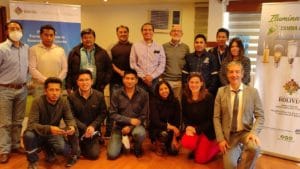 In May 2022, members of the UN Environment Programme (UNEP) United for Efficiency (U4E) technical team visited La Paz to meet with national stakeholders implementing their three-year full lighting market transformation project, Delivering the Transition to Energy Efficient Lighting in Bolivia.
In May 2022, members of the UN Environment Programme (UNEP) United for Efficiency (U4E) technical team visited La Paz to meet with national stakeholders implementing their three-year full lighting market transformation project, Delivering the Transition to Energy Efficient Lighting in Bolivia.
The objective of the visit was to facilitate discussions on the implementation of the various aspects of the countrywide project, to provide technical advice on ongoing activities and to help identify areas where support can be targeted to build in-country capacity to meet the project objectives. The transformation of the entire Bolivian market to modern eco-efficient lighting in all sectors could save all Bolivian consumers, including government, over $50 million a year at current electricity costs, as well as bring significant climate and pollution emissions savings.
The U4E team included Mr Roberto Borjabad and Ms Soledad Garcia, U4E’s Programme Officers for the project, Mr Bruno Lafitte, one of U4E’s international lighting experts, Mr Krystian Muñoz, a monitoring, verification and enforcement (MVE) expert from ECONOLER who are working with U4E on the project, and Mr Ignacio Duque, U4E’s international environmentally sound management (ESM) expert.
The visit took place over four days and included a range of individual meetings and multi-organisation workshops with all the national stakeholders involved, including:
- The Ministry of Hydrocarbons and Energy (MHE) and the Ministry of Environment and Water (MAyA) who are the Government partners in the project.
- The Bolivian Institute for Standardization and Quality (IBNORCA), the Bolivian Metrology Institute (IBMETRO), the Vice-Ministry of Users’ Rights and Consumption and the customs authority who will all play key roles in the implementation of the monitoring, verification and enforcement aspects of the project.
- Representatives from the main local lighting distribution companies, including Signify, Electrored, Hiller Electric, Desmart Ltda. and Electricworld, and authorized waste collection operators from La Paz, Cochabamba and Santa Cruz.
Meetings with the MHE focused on the proposed new minimum energy performance standards (MEPS) and labelling scheme for residential and street lighting, the development of a national strategy for lighting in Bolivia, and the MVE infrastructure required to support the regulations.
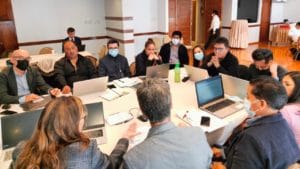 The former included a review of the overall findings from the market assessment undertaken in the early stages of the project, and the gaps and needs it identified, and discussion of the recommended criteria and levels for the MEPS and labelling scheme and which would be the most suitable national mechanism for adoption of the different criteria in Bolivia.
The former included a review of the overall findings from the market assessment undertaken in the early stages of the project, and the gaps and needs it identified, and discussion of the recommended criteria and levels for the MEPS and labelling scheme and which would be the most suitable national mechanism for adoption of the different criteria in Bolivia.
A draft of the National Strategy for Lighting was presented by MHE, and the U4E team offered general advice from international experience on the purpose of these documents, what information they should contain and how they should be structured. In addition, specific technical advice was given on the savings calculation model. This led to a detailed revision of the model to assess the energy, economic and environmental savings arising from the deployment of the proposed level of MEPS and supporting the technical staff from MHE on the methodology and assumptions behind the model.
During an MVE workshop, the up-to-date MVE mechanism proposed for Bolivia was presented by the technical expert. This included information on the steps to be undertaken when implementing an MVE system for the first time and details of the national stakeholders which need to be involved in the process and their responsibilities. MHE agreed with the proposed mechanism and to establish a new unit on energy efficiency within their existing structure to take on the overall MVE responsibility and functions.
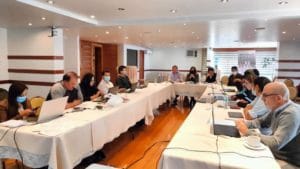 Follow up meetings with individual stakeholders, including the Bolivian customs authority, and a dedicated workshop with the main stakeholders involved in the MVE regulatory framework (IBNORCA, IBMETRO and MHE) built on these initial discussions to relay roles and responsibilities and invite inputs on the conditions of entry and overall monitoring, verification and compliance, for example, what should be added, what could be improved or removed, and what kind of capacity building their organizations needs. This information will be used for the development of the products to be delivered by U4E’s technical experts. In addition, advice on the specification of the testing equipment needed for verification testing was given to IBMETRO.
Follow up meetings with individual stakeholders, including the Bolivian customs authority, and a dedicated workshop with the main stakeholders involved in the MVE regulatory framework (IBNORCA, IBMETRO and MHE) built on these initial discussions to relay roles and responsibilities and invite inputs on the conditions of entry and overall monitoring, verification and compliance, for example, what should be added, what could be improved or removed, and what kind of capacity building their organizations needs. This information will be used for the development of the products to be delivered by U4E’s technical experts. In addition, advice on the specification of the testing equipment needed for verification testing was given to IBMETRO.
In a meeting with representatives from Bolivia’s main distribution lighting companies, the U4E lighting expert presented the proposed MEPS limits for residential and street lighting and gathered some additional information on the local market and its characteristics. Encouragingly, the levels were approved by the stakeholders. A field visit made to stores selling lighting equipment in La Paz, both from the formal and informal market, provided a further opportunity to understand the current local situation.
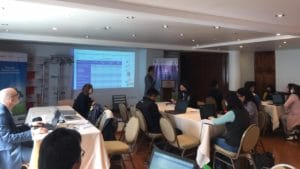 A stakeholder workshop on 5 May 2022 provided the opportunity for all parties involved in the lighting MEPS and labelling scheme and the associated enforcement activities to come together for the first time to discuss what is needed to enforce it, the mechanisms to be used, the roles and responsibilities that each would have, and what the next steps in its implementation will be. It was also a good opportunity for the MHE to hear directly from the lighting importers on the need to establish MEPS and that the levels proposed were reasonable and wouldn’t impact negatively on the market.
A stakeholder workshop on 5 May 2022 provided the opportunity for all parties involved in the lighting MEPS and labelling scheme and the associated enforcement activities to come together for the first time to discuss what is needed to enforce it, the mechanisms to be used, the roles and responsibilities that each would have, and what the next steps in its implementation will be. It was also a good opportunity for the MHE to hear directly from the lighting importers on the need to establish MEPS and that the levels proposed were reasonable and wouldn’t impact negatively on the market.
In separate virtual meetings, U4E’s environmentally sound management expert met with MAyA and authorized waste collection operators from La Paz, Cochabamba and Santa Cruz to gather information on current practices and to discuss the definition of an ESM pilot project for the collection and recycling of lamps and the possibility of implementing it in these cities.
The visit concluded with the organization of the formal Project Steering Committee, followed by a discussion on the next steps and some ideas for upcoming activities, such as sustainable public procurement measures for eco-efficient lighting products.
For further information on the project, please contact Roberto Borjabad at roberto.borjabad@un.org or click here, to download the project factsheet.
U4E’s Model Regulation Guidelines for lighting and Green Public Procurement Technical Guidelines and Specifications for Energy-efficient Lighting are available to download from our website.
Leave a Reply